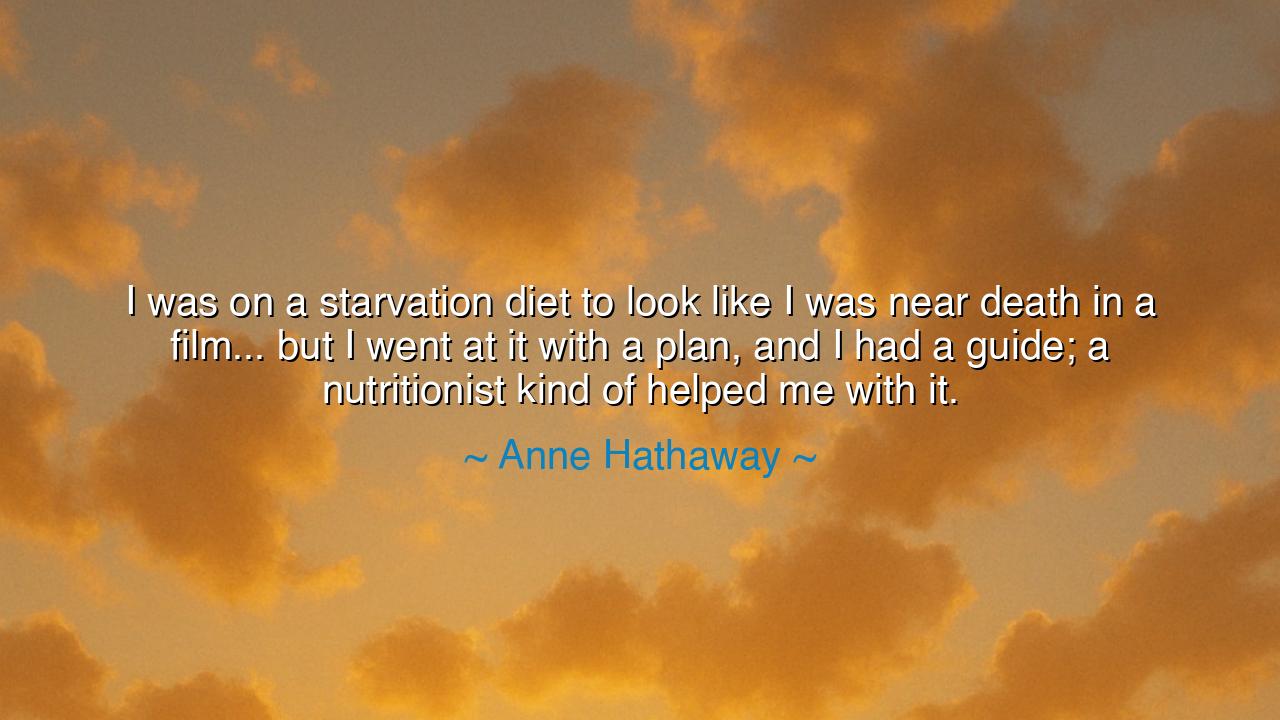
I was on a starvation diet to look like I was near death in a
I was on a starvation diet to look like I was near death in a film... but I went at it with a plan, and I had a guide; a nutritionist kind of helped me with it.






In the words of Anne Hathaway, the artist of grace and depth, there resounds a confession that is both human and heroic: “I was on a starvation diet to look like I was near death in a film... but I went at it with a plan, and I had a guide; a nutritionist kind of helped me with it.” Beneath these words lies not vanity, but sacrifice, not obsession, but discipline. Hathaway speaks not merely of a diet, but of the sacred burden carried by those who give their bodies to art. Her words echo an ancient truth—that to embody a role, to live a purpose, often requires one to walk the edge between creation and destruction. Yet even in that extremity, she sought wisdom and guidance, reminding us that intention and counsel are the difference between transformation and ruin.
There is power in her phrase, “I went at it with a plan.” For it tells us that passion, if left ungoverned, can consume rather than elevate. Many have sought greatness through extremes—fasts, vigils, pilgrimages, battles—and many have fallen to madness for lack of balance. Hathaway’s plan was her compass; her guide, her anchor. In this we see the eternal law of mastery: that no transformation, however noble, should be pursued without understanding. The fire that forges the sword can also melt it. Thus, the wise must temper their zeal with knowledge, their will with wisdom.
Her words also awaken the ancient dialogue between the body and the spirit. The ancients knew that the flesh is both vessel and voice. In every culture’s myths, heroes undergo trials of the body to awaken something higher within. The monks of old fasted not to perish, but to purify their minds. The warriors trained until exhaustion not to suffer, but to transcend fear. So too, Hathaway’s sacrifice of comfort was an offering—a means to embody truth in her art. Yet she did not descend into the abyss without a rope. Her nutritionist became like the philosopher’s mentor, guiding her through the perilous path between art and harm.
Consider the story of Christian Bale, who for his role in The Machinist reduced his body to skin and bone, surviving on a few apples a day. His devotion astonished the world, but it also revealed the danger of the unguarded pursuit. Where Bale plunged into extremity, Hathaway reminds us of the virtue of measured sacrifice—that the body is not a tool to be destroyed in service of greatness, but an instrument to be tuned. It is not weakness to seek help; it is wisdom. For even the mightiest heroes of old, from Achilles to Arjuna, relied upon mentors to preserve them from their own fervor.
The meaning of Hathaway’s experience, then, is not found in her deprivation, but in her discipline. She starved her body only in the context of her purpose, and under the watchful eye of understanding. She did not wander blindly into self-harm; she transformed the ordeal into art through structure, through intention. And in this lies a truth for all who strive—to change oneself without losing oneself. The flame of purpose must be fed carefully, lest it burn the vessel that carries it.
The lesson we must draw is this: in every great endeavor, whether physical, creative, or spiritual, guidance and moderation are the guardians of success. Do not mistake recklessness for courage, nor suffering for virtue. To pursue greatness without wisdom is to invite ruin; but to pursue it with knowledge and patience is to shape something divine. Seek mentors, build plans, and know your limits—not as walls, but as the lines that define your craft.
And so, let Hathaway’s words endure as a parable for all who burn with purpose. Sacrifice is holy when guided by wisdom; discipline is powerful when paired with compassion. Whether in art, in sport, or in life, remember: the body is not your enemy, but your ally. To honor it is to honor the spirit that dwells within. For in the end, greatness is not born from destruction, but from harmony—the balance between the hunger for excellence and the reverence for life itself.






AAdministratorAdministrator
Welcome, honored guests. Please leave a comment, we will respond soon